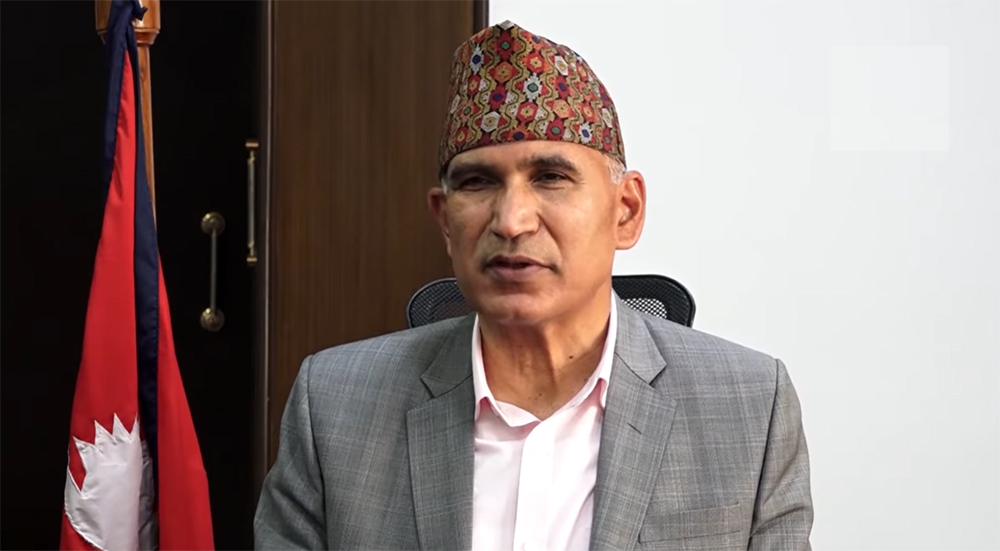The government of Nepal has clarified that the policy of exporting stone, ballast and sand to reduce the budget deficit mentioned in the budget of the Fiscal Year 2078/79 is not related to the Chure region. The government has clarified that the excavation will be done only from 92 mines in 14 districts identified earlier by the Department of Mines and Geology.
Budget No. 199 of the budget recently made public by the government states that trade deficit will be reduced by extracting mineral stones, ballast and sand on the basis of environmental impact assessment. In addition, provision has been made in the budget for exemption from import duty on construction of ropeway from industry to export point for transportation of exported mining construction materials.
Deputy Prime Minister and Finance Minister Bishnu Prasad Poudel said that even though Chure was not mentioned in the budget, it was an attempt to do politics in the name of Chure and clarified that there would be no interference in Chure. Expressing his commitment that the government will not compromise on the protection of the Chure area, he said, “Point 199 has the politics of connecting the Chure. Not a single head of stone and not a single head of soil can be excavated from the Chure. The Chure is an important asset of the country.
In a virtual program organized by the Nepal Environment Journalists Group today, he said that the government would not do anything outside the constitutional and legal provisions, adding that it was the policy of the Department of Mines and Geology to excavate from 92 sites previously identified. He said that the government was fully aware of the disturbance of the ecological balance while excavating and exporting minerals. Stating unnecessary confusion has been spread about the cutting of Siddhababa hill under Chure, he said that the government has started the process of construction of the tunnel to prevent the annual human damage caused by landsides.
Stating that the policy was brought on the basis of comparative advantage of exportable goods, Finance Secretary Shishir Dhungana said that different countries of the world have made progress by exporting and trading their goods and services. He said, “The government is aware of the need to replenish the mining construction materials in the country and export the surplus. The program has been brought for the same purpose.”
Members of National Planning Commission Dr. Krishna Prasad Oli, expressed the view that the country’s prosperity would be achieved if sustainable use of natural resources could be achieved through the use of modern technology. He said that this policy was necessary for the big projects and development of the country in the coming days without mining.
Krishna Poudel, chairperson of the Chure Terai Madhes Conservation and Development Committee, said that various discussion and debates after the budget were making it clear that the policy was not related to the excavation of Chure. He also expressed the view that all should work for the solution of the problems.
Secretary at the Ministry of Forests, Pem Narayan Kandel, clarified that stone, ballast and sand excavation would not be carried out in the Chure area under the budget policy, adding that there was no quality stone in the Chure. Ram Prasad Ghimire, Director General of the Department of Mines, said that mining would be more profitable than mining from rivers and streams. He also presented the annual revenue benefit to the government from 92 identified mines have no border and all of them are in the control hills.
Rameshor Khanal, former secretary to the government and former chairman of the Chure Committee, argued that the trade deficit could not be reduced by extracting stones, ballast and sand. He apprised about the problems and challenges faced by the government in exporting construction materials in the past. He also said that it would be better and more sustainable to work in the mid-hilly region by setting up a government mining company.
Environmentalist Binod Bhatta informed that the country needs to meet the needs of the country before extracting mining materials.
Journalist Chandra Kishor said that the government is the guardian and it should listen to the voice of the people of any region. Geologist Meghraj Dhital said that there would be no problem in excavating minerals on a scientific basis after conducting a detailed study. Expressing happiness over the consensus reached by all the stakeholders, he said that the group has always been vigilant on the issue of environmental protection.
As per the decision taken by the then government in 2072 BS after the complains of irregular exploitation of mineral construction materials increased, the Department of mines visited 92 places in Dhankuta, Morang, Udayapur, Sindhuli, Lalitpur, Makwanpur, Chitwan, Palpa, Arghakhanchi, Pyuthan, Salyan, Surkhet, Doti and Dadeldhura. The mining area was identified.
By Muna Chand




